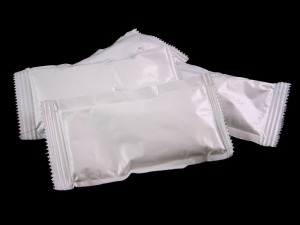 We have college students who meet here several times a week. They often stop by and pick up their dinner at some fast-food restaurant, unless I'm cooking for the study groups. Their bags often contain packets of ketchup, salt and pepper, Parmesan cheese, sweet and sour, or duck sauce, soy sauce, hot mustard, taco sauces, etc. So much of that was being thrown in the garbage along with the sacks they came in.
We have college students who meet here several times a week. They often stop by and pick up their dinner at some fast-food restaurant, unless I'm cooking for the study groups. Their bags often contain packets of ketchup, salt and pepper, Parmesan cheese, sweet and sour, or duck sauce, soy sauce, hot mustard, taco sauces, etc. So much of that was being thrown in the garbage along with the sacks they came in.
I started saving them and store them in a large empty oatmeal box which I covered with plain white paper and labeled. Now if the young people don't have enough of something, they know to go to that box and help themselves.
I can't tell you how many times I've raided that box myself to find ketchup when I'm making chili, and need a bit of sweet for my tomatoes instead of using sugar, or soy for stir-fried rice. It might not save me all that much money, unless you count the gas it'd take to get to a store to buy something.
I also save the extra napkins and wrapped straws the students being in. They all know where to find them if they forget to pick them up at the take-out counters.
By Julia from Boca Raton, FL
This page contains the following solutions.
I have a bag in the refrigerator to place the little packets of condiments left over from fast food restaurants. Make the perfect size for the lunch box and best of all they are free!
Here are the questions asked by community members. Read on to see the answers provided by the ThriftyFun community.
Can anyone please tell me the difference between vinegar and non-brewed condiment? i.e. when asked to use vinegar in a recipe - will non-brewed condiment (as bought in fish and chip shops) be a suitable alternative?
In response to Jeanne G: Vinegar from the French vin aigre (sour wine) is fermented from wine or cider. Malt vinegar is a two fold fermentation of barley malt or other cereals where starch has converted to maltose. Non brewed condiment which I have only come across in UK is a vinegar substitute made from food-grade industrial ethanoic acid. This is used in the manufacture of plastics and some pharmaceuticals. Sounds awful but its the best for fish 'n chips and perfectly good for all culinary uses. Hope that helps.
Avoid this filth like the plague. It is perfectly good for no culinary uses, although excellent as a low-cost 'cologne' to a certain type of gentleman.